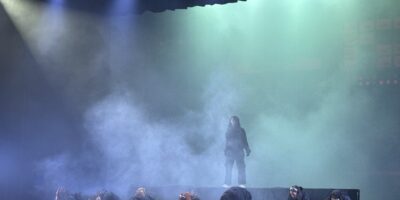These last couple of weeks were strange ones for indie music releases. No big names have actually released anything in this time, but a number of album release campaigns were shifting into high gear (Sufjan Stevens, Modest Mouse, Death Cab for Cutie, maybe Kendrick Lamar). And then all of a sudden a couple of days ago, two albums spontaneously leaked, as albums nowadays are wont to do. Modest Mouse’s Strangers to Ourselves and Sufjan Stevens’ Carrie & Lowell are both big releases from big artists that have both been operating for quite a long time now. And, at least in the opinion of someone who hasn’t spent enough time with either, they’re both very very good. I’ve decided on Sufjan over Modest Mouse mostly because I feel that I have put enough time in listening to Strangers to Ourselves to give an honest opinion.
Sufjan Stevens is normally lumped into the acoustic singer-songwriter genre, mostly because of the intimate detail in his lyrics and delicate arrangement of his songs. However, his previous albums range from standard “guy-with-guitar” (Seven Swans), to refined orchestral pop (Michigan and Illinois), to wobbly electro (Age of Adz, his latest LP). Here on Carrie & Lowell, the sonics are similar to what Sufjan was doing on Seven Swans, with lightly plucked guitar and hushed vocals. The themes, however, are more Age of Adz, finding Sufjan interspersing concrete details throughout the broad wash of allusions and abstractions. As for the concrete details part: Carrie & Lowell are Sufjan’s mother and step-father, with whom he had a tumultuous relationship during the early years of his life. And although never explicitly stated, the album centres on the death of his mother and Sufjan trying to navigate the emotions that arise when someone who was alternately so close and so distant suddenly leaves you.
The album’s opener, “Death with Dignity,” sets the stage nicely for the rest of the album. It juxtaposes heavy imagery of wide open landscapes with nimble singing and gently plucked guitar, creating a shimmering, gossamer whole. But undercutting the gentleness of the song are Sufjan’s constant musings on death and the afterlife: “What is that song you sing for the dead?” Although Sufjan is a devout Christian and there is a plethora of Biblical imagery in his music, Carrie & Lowell is full of what I see as agnostic musings: creeping doubt that maybe there isn’t anything better than what we have right now.
On the next song too (early single “Should Have Known Better”), lyrics speak of “bridge[s] to nowhere” and Sufjan’s “black shroud.” Here, though, he mixes his sparse acoustic guitar with melodic electronics which softly transform the song and pull it closer to being an electro-pop ballad. His penchant for painfully earnest and intimate lyrics is showcased here, as he recounts a lingering detail of time spent with his mother: “When I was three / three maybe four / she left us at that video store.” It’s a single line, easily lost amongst all the others in the song, and yet it is able to convey all of the confusion Sufjan is experiencing.
Elsewhere on the album, animal imagery is used heavily for a number of reasons. On “Fourth of July” Sufjan confronts his own mortality in the wake of his mother’s death while using bird metaphors as terms of endearment from mother to son: “my little hawk,” “my little dove.” Below the gentle singing, a low piano throb anchors the melancholy in Sufjan’s singing. It’s one of a number of tenderly understated ballads on Carrie & Lowell, many of which take a number of listens to show their full power.




Leave a Reply